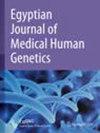Causal associations between gut microbiota and chronic prostatitis/chronic pelvic pain syndrome: a two-sample Mendelian randomization study
IF 1.2
Q4 GENETICS & HEREDITY
引用次数: 0
Abstract
Recent researches have increasingly indicated a strong correlation between the gut microbiota and chronic prostatitis/chronic pelvic pain syndrome (CP/CPPS). Nevertheless, the impact of gut microbiota on CP/CPPS still requires further elucidation. Employing the summary statistics provided by the MiBioGen consortium, we executed a two-sample Mendelian randomization (MR) analysis. The study involved 18,340 participants and considered gut microbiota as the instrumental variable. Chronic prostatitis summary statistics, representing 500 cases and 208,308 controls, were extracted from the GWAS Catalog release data as the disease outcome. Various methods, including weighted inverse variance, MR-Egger and weighted median, were employed to assess how gut microbiota interact and correlate with CP/CPPS. Sensitivity analysis was used to eliminate heterogeneity and horizontal pleiotropy. Our findings, primarily derived from the IVW approach, provided evidence for a causal link between five categories of gut microbiota and CP/CPPS. Resultantly, the genus Christensenellaceae (OR = 0.39, 95% CI 0.17–0.87, P = 0.02), genus Eisenbergiella (OR = 0.62, 95% CI 0.40–0.97, P = 0.04), genus Hungatella (OR = 0.49, 95% CI 0.28–0.85, P = 0.01) and genus Terrisporobacter (OR = 0.39, 95% CI 0.20–0.75, P = 0.00) exhibited a protective impact on CP/CPPS, while family Prevotellaceae (OR = 1.78, 95% CI 1.01–3.15, P = 0.05) had the opposite effect. No notable heterogeneity of instrumental variables or horizontal pleiotropy was detected. The findings of this study, which used a two-sample Mendelian randomization approach, indicate a causal link between gut microbiota and CP/CPPS. This could be valuable in offering fresh perspectives for additional mechanistic and clinical investigations of microbiota-related CP/CPPS. Nevertheless, additional randomized controlled trials are necessary for validation.肠道微生物群与慢性前列腺炎/慢性盆腔疼痛综合征之间的因果关系:双样本孟德尔随机研究
最近的研究越来越多地表明,肠道微生物群与慢性前列腺炎/慢性盆腔疼痛综合征(CP/CPPS)之间存在密切联系。然而,肠道微生物群对 CP/CPPS 的影响仍有待进一步阐明。利用 MiBioGen 联盟提供的汇总统计数据,我们进行了双样本孟德尔随机化(MR)分析。该研究涉及 18,340 名参与者,并将肠道微生物群视为工具变量。我们从 GWAS Catalog 发布的数据中提取了代表 500 例病例和 208,308 例对照的慢性前列腺炎汇总统计数据作为疾病结果。我们采用了各种方法,包括加权反方差法、MR-Egger 法和加权中位法,来评估肠道微生物群与 CP/CPPS 的相互作用和相关性。敏感性分析用于消除异质性和水平多向性。我们的研究结果(主要来自 IVW 方法)为五类肠道微生物群与 CP/CPPS 之间的因果关系提供了证据。因此,Christensenellaceae 属(OR = 0.39,95% CI 0.17-0.87,P = 0.02)、Eisenbergiella 属(OR = 0.62,95% CI 0.40-0.97,P = 0.04)、Hungatella 属(OR = 0.49,95% CI 0.28-0.85,P = 0.01)和Terrisporobacter属(OR = 0.39,95% CI 0.20-0.75,P = 0.00)对CP/CPPS具有保护作用,而前孢子菌科(OR = 1.78,95% CI 1.01-3.15,P = 0.05)则具有相反的作用。未发现工具变量或水平多效性的显著异质性。本研究采用了双样本孟德尔随机方法,其结果表明肠道微生物群与 CP/CPPS 之间存在因果关系。这将为更多与微生物相关的 CP/CPPS 机理和临床研究提供新的视角。不过,还需要更多的随机对照试验进行验证。
本文章由计算机程序翻译,如有差异,请以英文原文为准。
求助全文
约1分钟内获得全文
求助全文
来源期刊

Egyptian Journal of Medical Human Genetics
Medicine-Genetics (clinical)
CiteScore
2.20
自引率
7.70%
发文量
150
审稿时长
18 weeks
 求助内容:
求助内容: 应助结果提醒方式:
应助结果提醒方式:


